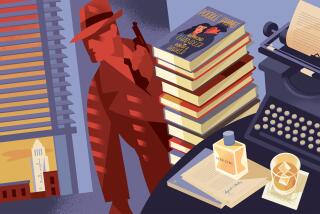Bret Easton Ellis’ wilted innocence
” New York is so over,” says Bret Easton Ellis, sitting behind the glass-topped desk in his home office. “Who cares about New York? L.A. is where it’s at right now.”
Outside the windows of his high-rise, hillside apartment, Los Angeles appears serene, nothing but green treetops, a few glittery skyscrapers and a hazy horizon. From here, there is little evidence of the dead-eyed rich kids and existential dread of a city “afraid to merge,” as Ellis wrote in “Less Than Zero.”
Published in 1985, the book was heralded as a cultural touchstone by baby boomers looking to understand what was then called the MTV generation. “It’s a very grouchy book about my generation,” Ellis says today. “It’s not a love letter to them at all. It’s, like, ‘I don’t like you guys.’”
Vintage Contemporaries is releasing a new edition for the book’s 25th anniversary, and Ellis has returned to the same characters in his new novel, “Imperial Bedrooms” (Alfred A. Knopf: 174 pp., $24.95), out this month.
The narrator is, once again, Clay, whom we knew before as a college student on break; now in his 40s, he’s a screenwriter successful enough to score the odd producing credit and its attendant Hollywood power. His orbit soon intersects with the other characters who appeared in “Less Than Zero,” including the fun, desperate Julian.
Robert Downey Jr. was unforgettable as Julian in the 1987 film, which wrongheadedly inserted pat moral lessons in place of the book’s bold emptiness. In the film version, Julian died, a detail author Ellis could have ignored in this sequel. Instead, he addresses the contradictory stories with writerly jujitsu.
“They had made a movie about us,” “Imperial Bedrooms” begins. “The movie was based on a book by someone we knew…. It was labeled fiction but only a few details had been altered and our names weren’t changed and there was nothing in it that hadn’t happened.” It’s a nifty trick, setting up this book as the primary narrative, one that trumps Ellis as author and the real world.
It is, perhaps, necessary. Ellis shares biographical details with Clay, and, after “Less Than Zero” became successful, party-boy Ellis was often conflated with his fictional counterpart. In the ‘80s, Ellis, Jay McInerney (“Bright Lights, Big City”) and Tama Janowitz (“Slaves of New York”) became the New York brat pack of writers. Brash behavior, party-going and substance-indulging landed them in gossip columns like the New York Post’s Page Six. Enriched by the runaway success of his first novel and the film adaptation, enjoying the limelight, Ellis appeared to be much like a character from one of his books.
Then “American Psycho” was dropped before publication by Simon & Schuster — a strong move against an established author — for its graphic, misogynistic violence. The book, released in 1991 by Vintage, was lambasted by Gloria Steinem and boycotted by other feminist leaders.
To deal with his notoriety, which Ellis recently told Vice magazine is a “very difficult thing to kind of dismantle,” he has regularly put shadows of himself in his fiction. In his last novel, “Lunar Park,” a hybrid literary fiction and ghost story, the main character was named Bret Easton Ellis. Which, admittedly, might not have been the most effective way to prevent confusion; when pressed, Ellis doesn’t want to discuss it further. “I don’t know why,” he says. “I don’t want to stop myself from doing it. It’s just the way I write novels.”
That he’s been writing novels — that these books don’t just spring from his personality fully formed — is sometimes overlooked. No matter what ugly or histrionic parts of the zeitgeist “American Psycho” tapped into, it was still a book that Ellis had to sit and write, which he did, in four drafts, on an Olivetti typewriter. And after 25 years, the blank sun-bleached poetry of “Less Than Zero” is undiminished.
Ellis’ tools have changed — he’s got a couple of computers — but his method is largely the same. He spends a lot of time gestating an idea, making notes — “voluminous notes,” he says — then builds a detailed outline that winds up being longer than the finished book; at that point, he’s about 70% there. “It’s rare to find an idea for a novel that you want to stay with for a couple of years,” Ellis explains. “That’s probably why I’ve written so few novels.” The first person who reads his work is his agent, who gets the manuscript when it’s complete.
“The biggest challenge for a writer who has success early is to keep doing interesting work,” says Morgan Entrekin, publisher of Grove/Atlantic, who saw “Less Than Zero” in rough form and then acquired it for Simon & Schuster. “Bret has succeeded at that as well or better than any writer of the last 30 years.”
Although Ellis insists the experience of writing is fun for him, it comes from a place of intense emotion. “It doesn’t come from being happy, and it doesn’t come from being bored,” Ellis said. “Imperial Bedrooms” came from “the dark room,” he says. He warns that this book may make fans of “Less than Zero” feel betrayed.
Clay, once a paralyzed observer, is now a more active character and has grown to be a narcissist. As the novel progresses, he tries to get a movie made, woos an ambitious actress and sets Julian up to be murdered. In Hollywood — the central narrative of which, Ellis insists, is exploitation — Clay is as manipulative as the people around him. “Yeah, he is guilty,” Ellis says. “Aren’t we all? What does age do to you? I’m no more innocent than I was when I was 25. I’m far more guilty than I was when I was 19. I’ve seen a lot more, I’ve done a lot more.”
In a forest-green Izod and jeans, still boyish at 46, he wears his experiences lightly. In 2005, after years of dodging questions about his sexuality, Ellis publicly acknowledged his relationship with sculptor Michael Wade Kaplan, who died suddenly at age 30 the previous year. “Lunar Park” is dedicated to him.
Kaplan’s death precipitated Ellis’ return to Los Angeles, his hometown. “It took a while to adjust, after living in New York for so long,” Ellis admits. But he sees New York as “Empire” and Los Angeles as “post-Empire,” terms for defining American postwar dominance and decline that he’s been riffing on in private and on Twitter. A successful first novel that makes a cultural splash? Very Empire.
“There were hundreds of books after Jay [McInerney’s] and mine were published,” he says. “Basically, if you had a manuscript, and you were in your 20s, and reasonably nice looking, you got a deal. Boom! They were everywhere.” While few measured up to McInerney’s and Ellis’ success, the trend brought David Foster Wallace (“The Broom of the System,” 1987) and Michael Chabon (“Mysteries of Pittsburgh,” 1988) into publishing’s welcome arms.
“I just don’t see the literary breakthrough novel happening with the regularity that it was happening in the ‘80s and ‘90s,” Ellis says. “People don’t read them as much. I don’t hear people talking about books in the way that they used to talk about books.”
Like Clay, Ellis has turned to screenwriting. He was proud of his script for “The Informers,” based on his short stories, although he didn’t like the end result. He is currently at work on a script based on artist Jeremy Blake and his girlfriend, writer-blogger Theresa Duncan, titled “The Golden Suicides.”
For all his complicated engagements with Hollywood, fiction seems the thing Bret Easton Ellis was born to do. “You’re writing the novel because you want to write the novel,” he says. Then he pauses, as if he’s just discovered something in saying it out loud. He repeats: “You write the novel because you want to write the novel.”
Kellogg is lead blogger for Jacket Copy, The Times’ book blog
More to Read
The biggest entertainment stories
Get our big stories about Hollywood, film, television, music, arts, culture and more right in your inbox as soon as they publish.
You may occasionally receive promotional content from the Los Angeles Times.







